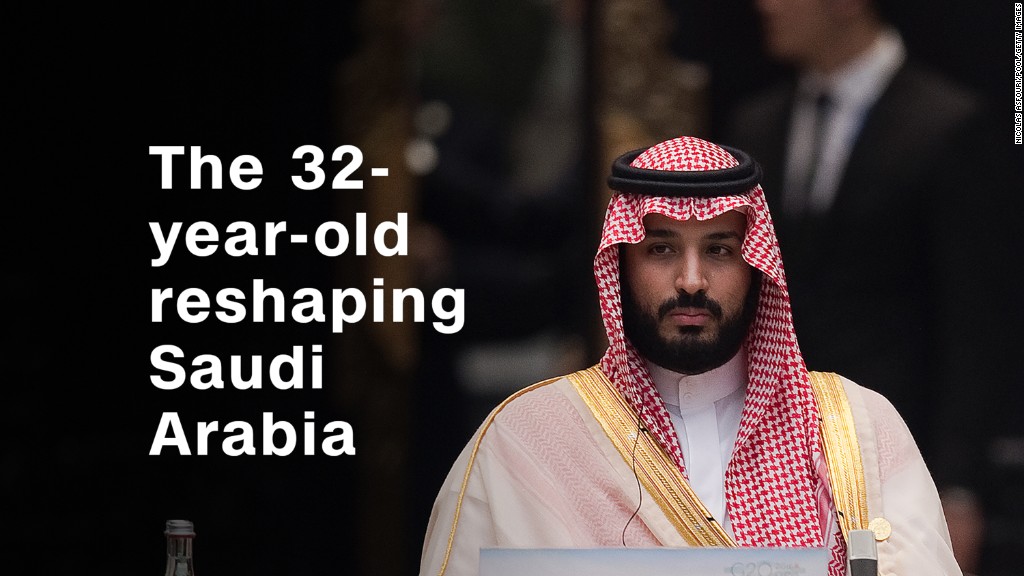Corruption Chaos in Saudi Arabia, Unprecedented Arrests and Firings
In Shocking Purge, Saudi King Arrests Billionaire Prince Bin Talal, Dozens Of Others In Cabinet Crackdown
ZeroHedge.com
In a shocking development, Saudi press Al Mayadeen reported late on Saturday that prominent billionaire, member of the royal Saudi family, and one of the biggest shareholders of Citi, News Corp. and Twitter – not to mention frequent CNBC guest – Al-Waleed bin Talal, along with ten senior princes, and some 38 ministers, has been arrested for corruption and money laundering charges on orders from the new anti-corruption committee headed by Crown Prince Mohammed bin Salman, while Royal princes’ private planes have been grounded.
Among those fired and/or arrested are the head of National Royal Guards, Miteb Bin Abdullah, the Minister of Economy and Planning, Adel Fakeih, and Admiral Abdullah bin Sultan bin Mohammed Al-Sultan, the Commander of the Saudi Naval Forces.
#BREAKING Several Princes & Saudi businessmen are arrested for #MoneyLaundering and #corruption charges in #KSA 🇸🇦https://t.co/EPh5tyilp9 pic.twitter.com/qZ4WSkKXyT
— حسن سجواني 🇦🇪 Hassan Sajwani (@HSajwanization) November 4, 2017
As the local press further adds, the supreme committee chaired by Crown Prince and billionaire stops “on charges of money laundering.”

al-Waleed bin Talal is perhaps best known not only for his periodic CNBC appearances, but for his recurring on and off spats with president Trump:

According to al Arabiya, among those sacked and/or arrested are Moteib Bin Abdullah, Minister of the National Guard, and Prince Khalid bin Ayyaf has been appointed as his replacement. A second Royal Order was issued to relieve Minister of Economy and Planning, Adel al-Faqieh, from his duties, and the appointment of Mohammed Al Tuwaijri as Minister of Economy and Planning.
According to a Royal Decree issued by King Salman on Saturday the anti-corruption committee is chaired by the Crown Prince with the membership of: Chairman of the Monitoring and Investigation Commission, Chairman of the National Anti-Corruption Authority, Chief of the General Audit Bureau, Attorney General and Head of State Security.
As Saudi analysts were quick to point out, the purge by the Saudi King means that King Abdallah’s last remnants (Riyad firmer gov. & head of Nat. Guard); media moguls; SAGIA & financial policy officials have been purged.
As Bloomberg notes, changing the head of the National Guard, an institution that’s been controlled by the clan of the late King Abdullah, “is not like changing the minister of oil,” said Kamran Bokhari, a senior analyst with Geopolitical Futures and a senior fellow with the Center for Global Policy. “I wouldn’t be surprised if this leads to greater fissures within the royal family.”
Arabiya adds that King Salman also issued sacking and replacement orders for Admiral Abdullah bin Sultan bin Mohammed Al-Sultan, the Commander of the Naval Forces, is to be terminated and be retired; his replacement is Vice Admiral Fahd bin Abdullah Al-Ghifaili, to be promoted to the rank of admiral and be appointed as Commander of the Naval Forces.
Additionally, Minister of Economy and Planning Adel al-Faqieh was replaced by Mohammed al-Tuwaijri, SPA said, quoting a royal decree. Commander of the Saudi Navy, Abdullah al-Sultan, was replaced with Fahad al-Ghafli. The king also replaced Minister of Economy and Planning Adel Fakeih withMohammad Al Tuwaijri, his deputy.
Al Tuwaijri, formerly vice minister for economy and planning, had already played a key role in shaping Saudi economic and fiscal policy over the past year. Before joining the government in May 2016 he was Middle East chief executive for HSBC. He’s served as a frequent spokesman for the government’s economic reform plan on TV and with Western journalists.
King Salman also issued an decree forming an anti-corruption committee headed by the crown prince. Its powers include the ability to trace funds and assets, and prevent their transfer or liquidation on behalf of individuals or entities, along with the right to take any precautionary actions until cases are referred to relevant investigatory or judiciary authorities, according to a government statement.
The committee’s formation was deemed necessary “due to the propensity of some people for abuse, putting their personal interest above public interest, and stealing public funds,” the Royal Order said.
